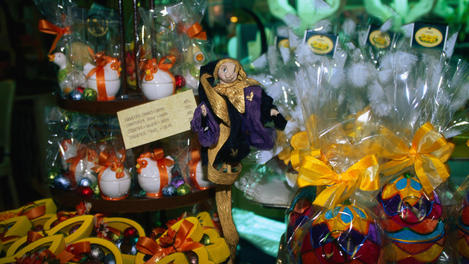
Most European countries offer the cultural thrill of unusual ways to expand your waistline, but Belgium elevates this often unexpected part of a continental jaunt into an art form. Temptation reaches out and grabs you at every turn. Avoided the crisply-fried potato treats from that fritteur van, served smothered in mayonnasise? Then you deserve a rich, dark Trappist beer or twelve. And should the vast vats of moules (mussels) not make it to your dinner plate then there’s the national dish, waterzooi to be eaten with thick hunks of bread. But chief among Belgian delights is chocolate.
This underrated nation has taken the idea of scoffing a sweet treat and elevated it to an artform.
Here’s where it began. In 1912, Jean Neuhaus had the bright idea of filling delectable chocolate shells with sweet, fondant fillings to create the praline. His wife came up with a decorative box, the ballotin. This invention proved popular. From his shop in Brussels chocolate emporiums spread across Belgium and gained the country an international reputation. Neuhaus has become an internationally famed chocolate brand.
The standard of chocolate served throughout the country is nothing less than thrilling. Chocolateries sell light, dark or white chocolate with every conceivable variation in between. Individual pieces are wrapped, coated or patterned individually and beautifully. As well as the ubiquitous pralines you’ll find sculptures and artistic creations all made solely using the chocolatiers skill. In one shop in Ostend I was unable to resist leaving with a chocolate whale. On cracking it open praline fish spilled out from his belly. If that wasn’t a moment of perfect happiness then I don’t know what is.
As you might expect, there are huge gulfs in quality, variety and cost of chocolate. National chains like Corné Port Royal and Neuhaus offer good quality at reasonable prices, but for the real fun look out for boutique chocolatiers like Planete Chocolat in Brussels and Del Rey in Antwerp. Here you’ll find delectable and individually crafted chocs which make the perfect gift – if you can get them home. No visit to Belgium is complete without a cruise around Bruges. And here is a temple to the cocoa bean, Choco-Story. Yes, a museum dedicated to the world’s finest sweet treat. If you’re not planning on leaving the capital, be a smart shopper and aim for the shops and cafes of Place du Grand Sablon rather than around the Grand Place. Chocolate and prices will be better.
The experience of buying some gives some insight into the level of reverence chocolate is held in. You may be gazing dreamily from outside but the real fun starts when you walk through the door.The atmosphere in any half-decent chocolaterie is one of reverence and dedication. Pralines wait in cool, quiet conditions for you to choose, and the mood in the queue tends to be one of gentle anticipation. The choice can be agonising, but don’t worry: staff are used to such dilemmas and are knowledgeable. Some sampling is permitted if you’re serious about buying. Once you’ve had your selection picked they’ll be lovingly wrapped and presented, and the at-times eye-watering price, determined by weight (the chocolate, not yours) is revealed. Then you’re out the door, wallet lighter but heart fluttering, eyes scanning the horizon for a secluded spot to sit and get stuck into your purchases.







